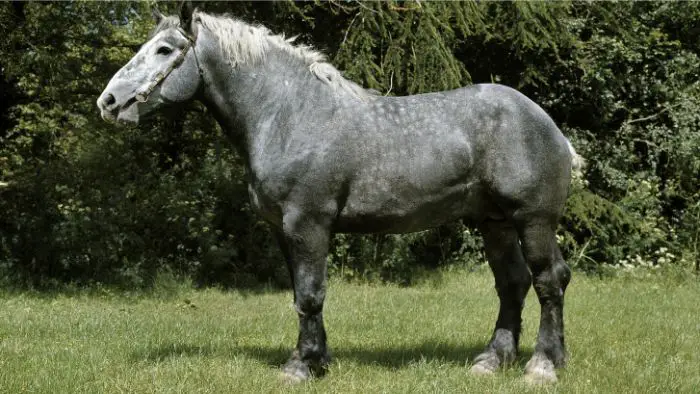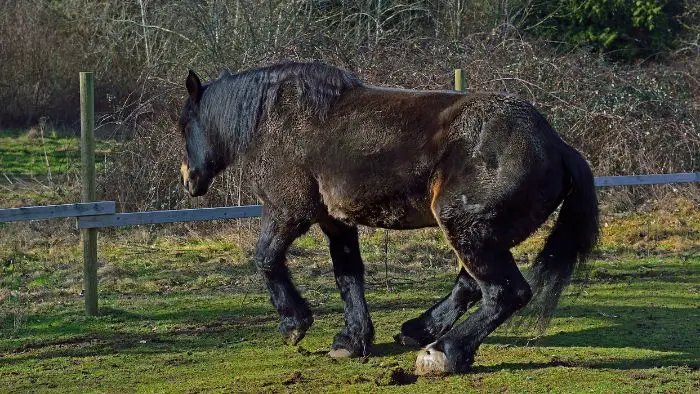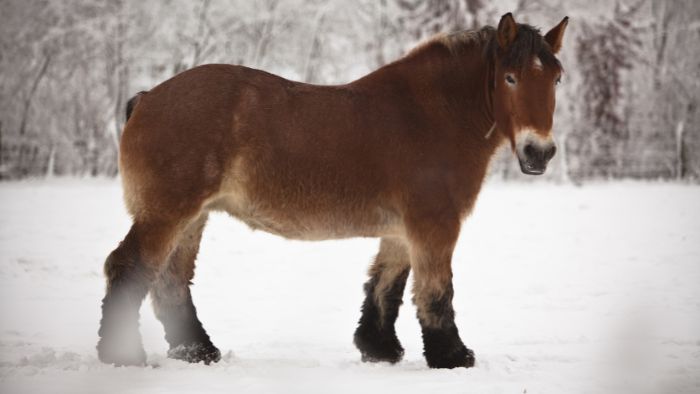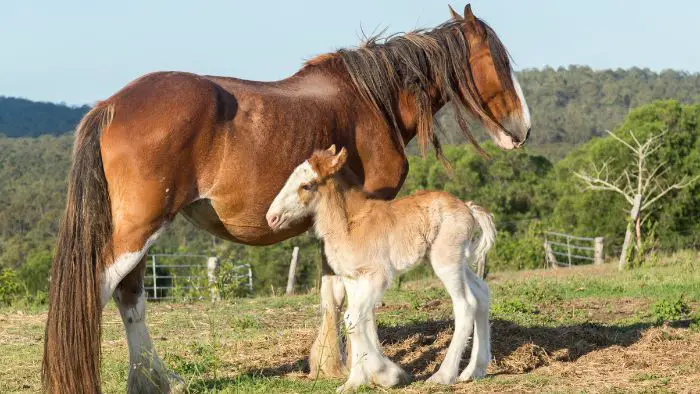Last Updated on July 17, 2022 by Guillermina
Horses are typically large, but who is the world’s fattest horse? Here’s the facts!
Most people feel tiny standing next to a horse. Luckily, these large animals have a docile nature, and if they’re already tamed, there’s nothing to be afraid of. If you meet the world’s fattest horse, you might not be able to climb on them, but staring is definitely allowed!
In this article, I share which horse breeds are the biggest ever and list the two record-holders known as the world’s biggest horses. I also explain why leaving it to genetics is a good idea and why fattening up your horse isn’t.
The Biggest Horse Breeds: Top 5!
Horses are powerful animals. Although horses are huge, and their size can be scary to people, They’re extremely intelligent and tend to have a calm nature when tamed. Here are the top 5 preferred large horse breeds:
The Dutch Draft
This heavy breed originates from the Netherlands. They have a chunky body, short legs, wide neck, and their eyes and ears are relatively small for their size.
The Dutch Draft is an unusual breed that isn’t widely seen or used today. They are fascinating horses due to their size and majestic appearance.
The Percheron
The Percheron was initially bred in France. They have an elegant appearance making them more popular than other heavy breeds.
An Australian Percheron mare holds the weight pulling record. She pulled 1100 pounds over a distance of 4 meters.
Dr. Le Gear is another famous horse of this breed. He reached a height of 83 inches and was the largest horse on earth while alive.
The Belgian Draft
As their name suggests, this giant horse breed originates from Belgium. Modern-day draft horses are bigger than those from a hundred years ago.
Belgian Drafts are primarily carriage horses, and their backs are short but wide. They’re known for their calm and intelligent natures, making them one of the most popular breeds amongst large horses.
The Clydesdales
These magnificent horses can instantly be recognized by their brown legs and extensive white sock-like feathering.
They’ve achieved fame thanks to the Budweiser ads they appeared in.
The Shire Horse
This large breed originates from Great Britain. They’re exceptionally tall and heavy.
Shire Horses have held world records for both the tallest and largest horse. Their weight averages between 1800 to 8500 pounds. The largest historically recorded Shire was a horse named Mammoth. He was 84 feet tall.
The World’s Fattest Horse
Fat is such a harsh word, so we’ve rounded up the heaviest and tallest horses in the world!
- The biggest horse ever recorded in history was Sampson. He was later renamed Mammoth. Mammoth stood 84 inches tall and weighed 3370 pounds when he was measured in 1859. Mammoth was a Shire Horse.
- The second biggest horse was called Big Jake. Big Jake was a Clydesdale. He stood almost 82 inches tall and weighed 2500 pounds. Big Jake died at the age of 20 in 2021.
No other horses were verified to weigh as much as these two.
Does The World’s Fattest Horse Have Health Issues?
Overweight horses can have a lot of health issues. It’s best to leave heaviness to genetics and not fatten your horse up for a title.
Health issues caused by the extra weight and can include any or all of the following conditions:
Heart and Lung Pressure
Increased weight causes the heart and lungs to work harder. This can lead to stress resulting in serious health issues or even death.
Orthopedic Issues
Overweight horses can develop orthopedic problems. Weight can put pressure on their joints and bones, especially in young and growing horses.
Laminitis and Flounder
Overweight horses are at a greater risk for laminitis and flounder. Obesity causes stress on their legs and muscles, increasing this risk.
Arthritis
Being overweight can cause arthritis in horses, and these symptoms are worse and more painful the heavier the horse.
Issues With Key Organs
Fat buildup around vital organs can cause them to work less effectively.
Joint and Leg Strain
Heavy horse breeds can experience a strain on their joints, legs, and feet.
This will cause pain and lead to the horse not moving around as much.
Decreased Energy
An overweight horse will be more lethargic and less likely to do things like running around the pasture. They will also tire more easily.
Temperature Control
Obese horses will feel warm more quickly. The fat deposits across their bodies will also make it more difficult for them to cool down efficiently.
Metabolic Issues
Being overweight will most likely lead to insulin resistance. This can cause laminitis.
Cushing’s disease is another metabolic disease to look out for. Your horse will look like they’re losing weight but only lose muscle mass.
To Sum It Up
Fat horses aren’t a common phenomenon, but large breeds are. Although the world’s largest recorded horse has passed, there are still huge horses we don’t know of!
If you’re looking for a big horse, choosing one from the breeds known to be large is your best shot. You should never fatten your horse up to win a competition or title. Obesity is extremely dangerous for horses, not even to mention cruel!
I hope you enjoyed this article! If you have more questions about horses and their size, ask them in the comments. I’d also love to read what your horse weights and measures or if you know someone with a particularly large horse!
FAQs
What was the biggest horse in the world in 2020?
The biggest horse alive in 2020 was Big Jake. He died in 2021.
What is the biggest horse alive?
After Big Jake died in 2021, no other horse has been recorded as the biggest alive to date.
How tall is the tallest horse in the world?
Big Jake was the tallest, most recent recorded horse in the world. He stood almost 82 inches tall.
How big do Clydesdale horses get?
Clydesdale horses average 70 inches and 2000 pounds.






